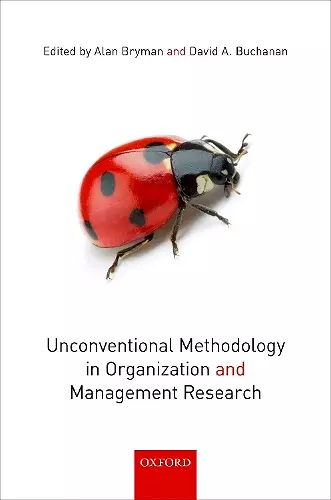Unconventional Methodology in Organization and Management Research
David A Buchanan editor Alan Bryman editor
Format:Hardback
Publisher:Oxford University Press
Published:22nd Mar '18
Currently unavailable, and unfortunately no date known when it will be back
This hardback is available in another edition too:
- Paperback£37.49(9780198796985)

Most researchers in organization and management studies stick to two or three traditional research methods like surveys and interviews. Sticking with the familiar is seen as a safe bet, and innovation is discouraged by academic incentives and rewards. But research participants are now suffering from 'survey fatigue', and using the same old methods runs the risk of generating the same old findings. This book describes twelve unconventional methodologies in organization and management research. These include unconventional research settings and data sources, unconventional research designs and data collection methods, unconventional analytic approaches, and designs and methods that exploit new technology developments. The aim is to encourage dialogue and experimentation with regard to the development of innovative, unconventional approaches to organization and management research. Several commentators have criticized the way in which research methods have become more formulaic, and have argued for greater diversity in research approaches. The methodological perspective that the we adopt shapes our interpretation of the information that we gather. Different methods generate different kinds of information, leading to different ways of understanding the phenomena that we are investigating. Our methods influence our styles of theorizing, ways of thinking and reasoning, and forms of writing and reporting research. This book will be of value to academic researchers in organization and management studies, Doctoral candidates, and Masters students on MBA and similar programmes.
Bryman and Buchanan have assembled an interesting and rigorous set of chapters designed to introduce readers to some of the most novel approaches to data collection, research design, and data analysis. Importantly, this assemblage includes ideas sampled from a broad array of disciplines spanning quantitative, qualitative, and mixed methods domains. I strongly recommend this book to any scholar seeking to expand the tools comprising his or her methodological tool chest.
At present there are strong institutional forces pushing scholars towards publishing safe, conventional papers, which rarely advance methodological thinking or generate major theoretical advances. Unconventional Methodology in Organization and Management Research is a welcome call for pluralism and diversity, which brings together a provocative and stimulating collection of contributions. It should be compulsory reading for students of research methods, but will also provide more experienced scholars with valuable insights and hopefully challenge them to expand their methodological repertoires.
Most journal editors and readers crave 'something different' in topics of inquiry and the design of research. This book shows why conservatism in fact prevails and provides a powerful and comprehensive set of exemplars of alternative unconventional approaches, covering sources of data, methods, and modes of analysis. It will inspire scholars to be more imaginative in their research. Journal editors and their readers will be truly grateful.
At a time it is common to bemoan research which is rather boring this stimulating book conceived by Alan Bryman and David Buchanan points out that methods matter and that most researchers use a limited range of conventional approaches which affects what they see and how they see it. Furthermore researchers' methodological perspective also shapes their interpretation of the research. They point the way forward for more adventurous research with unconventional approaches to methodology including unconventional settings, unconventional research design and data collection, and unconventional analytic approaches.
ISBN: 9780198796978
Dimensions: 241mm x 163mm x 24mm
Weight: 632g
318 pages